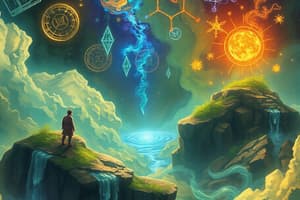Podcast
Questions and Answers
Which branch of science focuses on human behavior and societies?
Which branch of science focuses on human behavior and societies?
- Formal Sciences
- Applied Sciences
- Natural Sciences
- Social Sciences (correct)
What is the correct order of steps in the scientific method?
What is the correct order of steps in the scientific method?
- Experimentation, Observation, Analysis, Question, Hypothesis, Reporting
- Observation, Question, Hypothesis, Experimentation, Analysis, Reporting (correct)
- Hypothesis, Experimentation, Question, Observation, Reporting, Analysis
- Question, Observation, Analysis, Reporting, Hypothesis, Experimentation
Which of the following best describes a scientific law?
Which of the following best describes a scientific law?
- A well-substantiated explanation based on evidence
- A tentative prediction that can be tested
- A statement describing a consistent natural phenomenon (correct)
- A variable that alters the outcome of an experiment
Why is ethical consideration important in scientific research?
Why is ethical consideration important in scientific research?
What can lead to advancements in technology and medicine?
What can lead to advancements in technology and medicine?
What is the role of interdisciplinary research in current scientific trends?
What is the role of interdisciplinary research in current scientific trends?
Which notable scientist is known for the Theory of Evolution?
Which notable scientist is known for the Theory of Evolution?
What characterizes applied sciences?
What characterizes applied sciences?
Flashcards are hidden until you start studying
Study Notes
Definition of Science
- Systematic study of the natural world.
- Employs empirical methods and evidence-based reasoning.
Branches of Science
- Natural Sciences
- Study of the physical world (e.g., physics, chemistry, biology).
- Social Sciences
- Study of human behavior and societies (e.g., psychology, sociology, economics).
- Formal Sciences
- Study of abstract concepts (e.g., mathematics, logic, computer science).
- Applied Sciences
- Practical application of scientific knowledge (e.g., engineering, medicine).
Scientific Method
- Observation
- Gathering information through the senses.
- Question
- Formulating questions based on observations.
- Hypothesis
- Making a testable prediction.
- Experimentation
- Conducting experiments to test the hypothesis.
- Analysis
- Analyzing data to draw conclusions.
- Reporting
- Sharing findings with the scientific community.
Key Concepts
- Theory: Well-substantiated explanation based on a body of evidence (e.g., Theory of Evolution).
- Law: A statement that describes a consistent natural phenomenon (e.g., Newton's Laws of Motion).
- Variable: Any factor that can alter the result of an experiment (independent, dependent, controlled).
Importance of Science
- Advances technology and medicine.
- Informs policy and decision-making.
- Enhances understanding of the universe and our place in it.
- Promotes critical thinking and problem-solving skills.
Ethical Considerations
- Integrity in research and reporting.
- Consideration of human and environmental impacts.
- Responsible use of technology and data.
Current Trends in Science
- Interdisciplinary research (e.g., biochemistry, environmental science).
- Advances in artificial intelligence and data science.
- Focus on sustainability and addressing climate change.
Notable Scientists
- Isaac Newton: Laws of motion and gravitation.
- Charles Darwin: Theory of evolution.
- Albert Einstein: Theory of relativity.
- Marie Curie: Radioactivity and Nobel laureate.
Science and Society
- Role in education and literacy.
- Influence on culture and social norms.
- Contribution to global challenges (e.g., health crises, climate issues).
Definition of Science
- The systematic study of the natural world
- Utilizes empirical methods and evidence-based reasoning
Branches of Science
- Natural Sciences: Focus on the physical world, including physics, chemistry, and biology.
- Social Sciences: Study human behavior and societal interactions, encompassing disciplines like psychology, sociology, and economics.
- Formal Sciences: Deal with abstract concepts and systems, such as mathematics, logic, and computer science.
- Applied Sciences: Apply scientific knowledge to practical problems and solutions, as seen in engineering and medicine.
Scientific Method
- A systematic approach to investigating phenomena and acquiring knowledge.
- Observation: Gathering information through the senses.
- Question: Formulating a clear and specific question based on observations.
- Hypothesis: Proposing a testable prediction to answer the question.
- Experimentation: Designing and conducting experiments to test the hypothesis.
- Analysis: Analyzing data collected from experiments to draw conclusions.
- Reporting: Sharing findings with the scientific community through publications, presentations, or other means.
Key Concepts
- Theory: A well-supported explanation based on a large body of evidence, offering a framework for understanding a phenomenon (e.g., the Theory of Evolution).
- Law: A concise statement that describes a consistent natural phenomenon (e.g., Newton's Laws of Motion).
- Variable: Any factor that can change in an experiment, influencing the outcome; these can be independent (manipulated), dependent (measured), or controlled (kept constant).
Importance of Science
- Advances technology and medicine: Scientific discoveries and innovations lead to advancements in various fields, improving our lives.
- Informs policy and decision-making: Scientific data and research contribute to policy-making and decision-making, influencing regulations and strategies.
- Enhances understanding of the universe and our place in it: Science helps us understand the natural world, our place within it, and expands our knowledge about the cosmos.
- Promotes critical thinking and problem-solving skills: The scientific method encourages rational thinking, logical approach, and problem-solving skills.
Ethical Considerations
- Integrity in research and reporting: Maintaining honesty and accuracy in scientific research and reporting is vital for building trust and ensuring validity of findings.
- Consideration of human and environmental impacts: Scientists are increasingly aware of the ethical implications of their research, recognizing the potential impact on humans, animals, and the environment.
- Responsible use of technology and data: Ethical concerns must be addressed in the development and use of scientific technologies and data to avoid misuse and ensure benefit to society.
Current Trends in Science
- Interdisciplinary research: Combining knowledge and expertise from different scientific disciplines, like in biochemistry or environmental science.
- Advances in artificial intelligence and data science: The rapid development of AI and data analysis tools is transforming scientific research, assisting in complex data analysis and prediction.
- Focus on sustainability and addressing climate change: Scientists are dedicating significant efforts to understanding and addressing climate change, aiming for sustainable solutions and preserving the planet.
Notable Scientists
- Isaac Newton: Formulated the Laws of Motion and Universal Gravitation, fundamentally altering our understanding of physics and the universe.
- Charles Darwin: Proponent of the Theory of Evolution by Natural Selection, a foundational concept in biology.
- Albert Einstein: Developed the Theory of Relativity, revolutionizing our understanding of space, time, gravity, and the universe.
- Marie Curie: Pioneered research on radioactivity, the first woman to win a Nobel Prize, and the only person to win Nobel Prizes in two different scientific fields (physics and chemistry).
Science and Society
- Role in education and literacy: Scientific knowledge and literacy are crucial for informed citizens to understand and engage with the world around them.
- Influence on culture and social norms: Science influences culture and social norms by shaping our understanding of the world, ethical practices, and technological advancements.
- Contribution to global challenges: Science plays a vital role in addressing global challenges, such as health crises, climate change, and sustainable development.
Studying That Suits You
Use AI to generate personalized quizzes and flashcards to suit your learning preferences.




